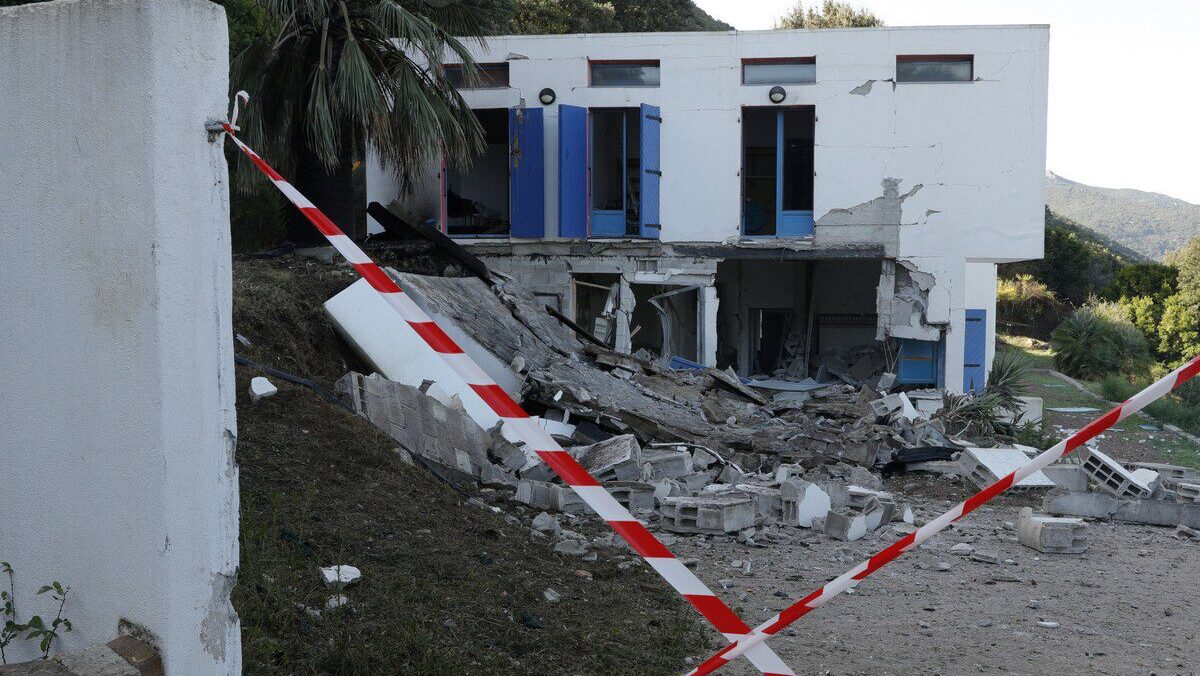
The area is cordoned off as debris lay strewn outside a damaged house, targeted by an explosion in Villanova, on the French Mediterranean island of Corsica on October 9th, 2023.
Photo: PASCAL POCHARD-CASABIANCA / AFP
Just a day after Israel was attacked by Hamas, Corsica was rocked by a series of explosions on Sunday night. An estimated 22 bombs, seemingly synchronized to go off at the same time, damaged various mainland French citizens’ second homes.
Authorities on the Mediterranean French island have reported that, since most of these residences stood vacant, no one was injured.
On Monday, the Front de Libération Nationale Corse (FLNC), an armed group agitating for the island’s complete autonomy from Paris, claimed responsibility for the “series of actions” it had carried out across the island that night.
ALERTE – "Nuit bleue" en #Corse. Une dizaine d’attentats à la bombe, ciblant des résidences, sont recensés depuis quelques heures sur l'île, notamment autour d'Ajaccio et au Cap Corse (Corse-Matin / France 3). pic.twitter.com/9dzBd39LLH
— Infos Françaises (@InfosFrancaises) October 8, 2023
In a succinct one-page communiqué sent to the daily newspapers Corse-Matin, the militant group noted Corsica has “no common destiny with France.”
Largely dormant since 2016, the FLNC was roused into action following Corsican nationalist Yvan Colonna’s death last year. While in prison, where he was serving a life sentence for the 1998 murder of prefect Claude Érignac, Colonna—who had fast become a symbol of the armed struggle against the French state—died after being attacked by a fellow inmate.
After Colonna’s death, riots broke out in Corsica, which is otherwise known as the Île de Beauté ( ‘Island of Beauty’). In an effort to bring a halt to the violence, French Interior Minister Gérald Darmanin then pledged that Paris would consider granting the island more autonomy.
While Corsican authorities have gradually accrued more powers over the decades, complete autonomy for the wayward island has long been considered taboo in Paris. The French government, not without cause, fears that a Paris that shows itself too mollified might embolden other regions with separatist inclinations, such as the French Basque Country and Brittany.
In late September this year, French President Emmanuel Macron nevertheless showed himself amenable to the notion of a more autonomous Corsica. Having stated he was in favor of this “new step,” he proposed not an autonomy “against the State, nor an autonomy without the State, but an autonomy for Corsica and within the Republic,” the French president said before the island’s nationalists-dominated parliament.
Macron spoke of the island’s “historical, linguistic and cultural community,” yet did not mention there was such a thing as a distinct Corsican people. The Corsican language should in Macron’s view be “better taught,” but thus far, no initiative has been taken to allow its usage in French public offices and the regional parliament, where it is still officially banned.
Although Macron’s rapprochement marked a notable shift in policy—never before had a French President even uttered the word ‘autonomy’ before the over 50-year-old Corsican body—some among the nationalist contingent were not convinced.
Macron also promised to combat the island’s high property prices. Young Corsicans in particular face significant obstacles in trying to rent, let alone buy, a house. For this reason, the island’s nationalists have been calling for a residence status—allowing only people who have lived on the island for five years to buy a house there—for years, so that native Corsicans would be protected from (wealthier) French from the mainland outbidding them.
During his visit, Macron however did not mention if such a special residence status was even being considered.
By targeting these second homes, some of which are still under construction, the FLNC’s motive is then, besides its usual demand for full independence, unmistakable.
